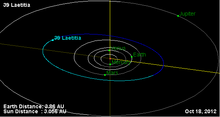喜神星
外观
(重定向自小行星39)
 | |
| 发现 | |
|---|---|
| 发现者 | 让·查科纳克 |
| 发现日期 | 1856年2月8日 |
| 编号 | |
| 命名依据 | 莱蒂西亚 |
| 小行星分类 | 主带 |
| 轨道参数[2] | |
| 历元 31 December 2006 (JD 2454100.5) | |
| 远日点 | 461.503 Gm (3.085 AU) |
| 近日点 | 366.877 Gm (2.452 AU) |
| 半长轴 | 414.190 Gm (2.769 AU) |
| 离心率 | 0.114 |
| 轨道周期 | 1,682.713 d(4.61 a) |
| 平近点角 | 58.261° |
| 轨道倾角 | 10.383° |
| 升交点黄经 | 157.168° |
| 近日点参数 | 209.560° |
| 物理特征 | |
| 大小 | |
| 质量 | (4.72±1.14)×1018 kg[4] |
| 平均密度 | 2.47±0.63 g/cm3[4] |
| 自转周期 | 0.2141 d (5.138 h)[2][5] |
| 几何反照率 | 0.287[2][6] |
| 光谱类型 | S[2] |
| 视星等 | 8.97[7] to 12.18 |
| 绝对星等(H) | 6.1[2] |
| 角直径 | 0.142′–0.051′ |

喜神星(小行星序号:39 Laetitia)是法国天文学家让·查科纳克于1856年2月8日发现的一颗大型主带小行星[8],并以罗马神话中掌管幸福的女神莱蒂西亚命名。它的光谱与S型相匹配,表示其成分是石质(硅酸盐)的组合物。它绕着太阳运行一周的周期为4.61年,绕轴自转的周期约为5.1小时。
在1968-74年间收集的光度测量资料被用来建构提供其形状和旋转资讯的光变曲线。它具有细长的三轴椭球体的一般形状,轴的长度之比等于15:9:5。主要表面特征的尺度为10 km,并且整个表面的颜色没有显著差异。在黄道坐标系中,估计旋转极点的方向是指向座标的 (λ0,β0) =(121°±10°, +37°±10°)[9]。
1988年,使用毛纳基山天文台的UH88望远镜搜索围绕这颗小行星运行的卫星或尘埃,但一无所获[10]。2006-08年间收集的光度观测被用来测量小行星光度随着时间变化的曲线。这些数据表明,这颗小行星可能具有复杂的形状,或者它可能是一个双小行星系统[11]。1998年3月21日对其掩星的观测获得了几个弦的长度,表明椭球体横截面为219 km × 142 km[3]。
相关条目
[编辑]参考资料
[编辑]- ^ John Craig (1869) The Universal English Dictionary
- ^ 2.0 2.1 2.2 2.3 2.4 2.5 Yeomans, Donald K. 39 Laetitia. JPL Small-Body Database Browser. NASA Jet Propulsion Laboratory. [2013-04-07]. (原始内容存档于2014-08-17).
- ^ 3.0 3.1 1998 European Asteroidal Occultation Results. euraster.net (a website for Asteroidal Occultation Observers in Europe). 1998-03-21 [2008-12-01]. (原始内容存档于2012-03-09). (Chords) 互联网档案馆的存档,存档日期23 July 2011.
- ^ 4.0 4.1 4.2 Carry, B., Density of asteroids, Planetary and Space Science 73, December 2012, 73: 98–118, Bibcode:2012P&SS...73...98C, arXiv:1203.4336
 , doi:10.1016/j.pss.2012.03.009. See Table 1.
, doi:10.1016/j.pss.2012.03.009. See Table 1.
- ^ Asteroid Lightcurve Parameters. Planetary Science Institute. [2008-11-03]. (原始内容存档于2006-06-14).
- ^ Asteroid Data Archive. Planetary Science Institute. [2008-11-03]. (原始内容存档于2006-05-23).
- ^ AstDys (39) Laetitia Ephemerides. Department of Mathematics, University of Pisa, Italy. [2010-06-26]. (原始内容存档于2012-03-27).
- ^ Numbered Minor Planets 1–5000, Discovery Circumstances (IAU Minor Planet Center), [2013-04-07], (原始内容存档于2012-02-22).
- ^ Sather, R. E., Minor planets and related objects. XIX – Shape and pole orientation of 39 Laetitia, Astronomical Journal 81, January 1976, 81: 67–73, Bibcode:1976AJ.....81...67S, doi:10.1086/111854.
- ^ Gradie, J.; Flynn, L., A Search for Satellites and Dust Belts Around Asteroids: Negative Results, Abstracts of the Lunar and Planetary Science Conference 19, March 1988, 19: 405–406, Bibcode:1988LPI....19..405G.
- ^ Vereshchagina, I. A.; et al, Some specific features of light curves of (39) Laetitia, (87) Sylvia, (90) Antiopa, and 2006 VV2 asteroids, Solar System Research 43 (4), August 2009, 43 (4): 291–300, Bibcode:2009SoSyR..43..291V, doi:10.1134/S0038094609040030.

